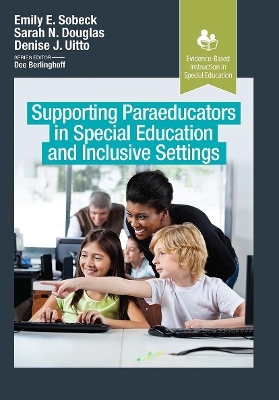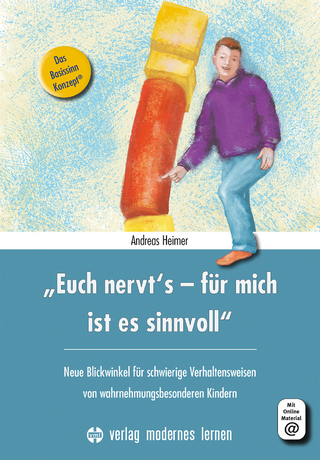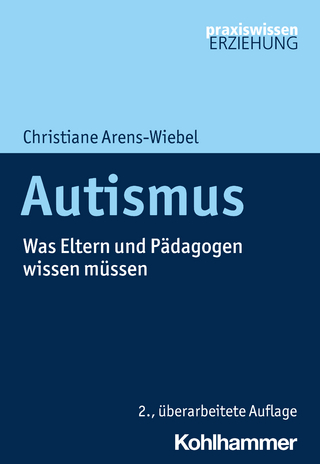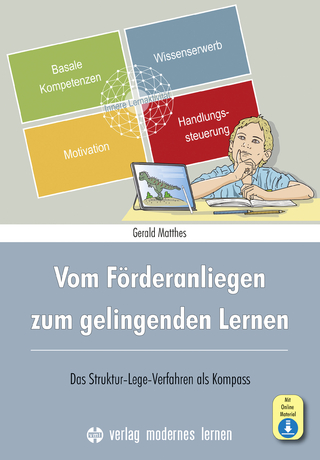
Supporting Paraeducators in Special Education and Inclusive Settings
Routledge (Verlag)
978-1-032-95712-8 (ISBN)
- Noch nicht erschienen (ca. November 2024)
- Versandkostenfrei innerhalb Deutschlands
- Auch auf Rechnung
- Verfügbarkeit in der Filiale vor Ort prüfen
- Artikel merken
The latest entry within the Evidence-Based Instruction in Special Education series, Supporting Paraeducators in Special Education and Inclusive Settings serves as an instructional tool for pre-service teachers and educators within higher education coursework, as well as a resource for in-service teachers. This text supports teachers in strengthening their knowledge and supervisory skills necessary to supervise and manage paraeducators in educational environments.
Through objectives, scenarios, content, and chapter questions, Drs. Sobeck, Douglas, and Uitto provide a thorough and applicable overview of working with and supervising paraeducators. In this text the roles and responsibilities of paraeducators, teachers, and school administrators relative to paraeducator training and supervision will be detailed, as well as tips for collaboration.
Included with the text are online supplemental materials for faculty use. School leaders and higher education faculty can use the online site for materials to support pre-service training within teacher preparation programs and professional development for in-service teachers.
Supporting Paraeducators in Special Education and Inclusive Settings fills an important need in the field and is a vital resource for current and future teachers when working with paraeducators.
Emily E. Sobeck, PhD earned a bachelor’s degree in Special Education and Elementary Education from California University of Pennsylvania in the fall of 2007 and began working as a special education teacher in the spring of 2008 in a public school district in Pittsburgh, Pennsylvania. She first served as a special education teacher for students in 9th to 11th grades, and then transitioned to a K to 1st special education position. With many of her students diagnosed with autism and a desire to learn more ways to support her students, Dr. Sobeck went back to California University of Pennsylvania to earn both a master’s degree in Special Education and an Autism Specialist Certification. While completing graduate school, Dr. Sobeck also worked closely with the Watson Institute receiving additional training, consultation, and support for her students. In 2012 Dr. Sobeck was selected for an Office of Special Education Programs (OSEP) grant-funded position as a doctoral student in Special Education at the University of Pittsburgh. With the support of the grant funds, Dr. Sobeck was able to transition out of the classroom and into a full-time doctoral fellowship. It was during this time that she began her research related to paraeducators. In 2015, she was selected as a Doctoral Student Scholar within the Division for Research within the Council for Exceptional Children (CEC) where she participated in training and coaching from top researchers in the field of special education. Upon graduating with a PhD in Special Education in 2016, her dissertation study, The Effects of Didactic Instruction and Performance Feedback on Paraeducator Implementation of Behavior Support Strategies in Inclusive Settings, was selected for the Outstanding Dissertation award through the Teacher Education Division (TED) within CEC in 2017. Dr. Sobeck has served as a faculty member at Franciscan University since 2016 where she is currently an Associate Professor of Special Education. She also has served as the membership chair for the Paraeducator Special Interest Group (part of the Teacher Education Division of CEC) since 2016. Within this role she has assisted in developing position papers, conducting research relative to paraeducators, creating webinar trainings, and supporting advancements in professional standards for paraeducators and teachers who work with paraeducators. Since working in higher education, Dr. Sobeck has obtained several grants, published more than 15 items, maintained an editorial position for several special education journals, and given more than 60 presentations and trainings, many of which had a primary focus on paraeducators. The Division for Research within CEC featured one of Dr. Sobeck’s manuscripts in 2019, and she was awarded Franciscan University’s Excellence in Scholarship in 2020. Much of her work has focused on paraeducator training, equipping paraeducators to manage challenging behavior, teacher and paraeducator relationships, and supporting paraeducators who implement Behavior Intervention Plans. Dr. Sobeck wholeheartedly believes this area of special education is crucial to the educational service delivery for students with disabilities and is excited to be able to share the information within this text. Sarah N. Douglas, PhD started her career in 2003 as a special education teacher in Flagstaff, Arizona, after earning a degree in Elementary and Special Education from Northern Arizona University. In her time in the classroom, she supported students with a variety of disabilities in resource, inclusive, and self-contained classroom settings. Dr. Douglas worked with a variety of paraeducators in her role as a teacher, and learned first hand about some of the benefits and challenges of their utilization in school settings. During her time teaching, she obtained a master’s degree in 2007 in Special Education with an emphasis in Low Incidence Disabilities and obtained a graduate certificate in Assistive Technology. The time Dr. Douglas spent in the classroom inspired her to go on to obtain a PhD in Special Education from Penn State University in 2011, where she began her research related to paraeducators and explored interventions to support students with complex communication needs. Since that time Dr. Douglas has served as faculty at Penn State University (2012 to 2014) and Michigan State University (2014 to current), where she now is an Associate Professor and Director of the RADD (Research in Autism and Developmental Disabilities) lab. Dr. Douglas has served as the secretary for the Paraeducator Special Interest Group (part of the Teacher Education Division of CEC) in 2013. In this role she has developed position papers, webinar trainings, shared recent research, and worked to move forward professional standards for paraeducators and teachers in their roles with paraeducators. During her career in academia, Dr. Douglas has obtained various funding to conduct research related to paraeducators, including a large-scale federal grant. She has published more than 60 items, with a large portion of her work focused on paraeducators. This has included the development and testing of interventions for paraeducators, exploratory work to understand paraeducator roles and experiences, literature reviews, reviews of training materials, and practitioner articles to bridge the research to practice gap. Dr. Douglas’s vast experience as a leader in the paraeducator literature and professionally related to paraeducators (as a teacher and researcher) makes her well qualified as an author of this text. Denise J. Uitto, EdD began her career as a speech-language pathologist after earning her degree at Bowling Green State University. She served one year in a county school system providing speech therapy services to students in multiple buildings. In the next few years, the field of special education changed rapidly with the implementation of new federal laws. Students previously denied an education were enrolled in public schools, including students with multiple disabilities. Dr. Uitto entered her teaching career serving as a teacher for students living in a long-term residential facility. Following the birth of her son, she returned to the school district as a paraprofessional in a resource room for students with cognitive disabilities. She performed multiple roles within the resource room such as clerical work, playground supervision, reinforcement of academic skills, and assisted students joining their peers in general education classrooms. Continuing her career as a teacher for students with multiple disabilities, her team supervised paraprofessionals as they performed health-related tasks and reinforced vocational and daily living skills. With encouragement and support from colleagues and administrators, she pursued a master’s degree in Special Education to earn a supervisory degree and an administrator certificate. Her administrator career began as a Supervisor of Special Education Programs, Preschool Special Education Administrator, then moved into two elementary principalships. Throughout her administrative career, the motivation to improve services for students with disabilities and special education programming continued. She wrote grants and utilized local funding to provide professional development for both teachers and paraprofessionals to support students with disabilities. Dr. Uitto earned a doctoral degree in Organizational Leadership with a cognate in professional development. With her background in teaching and administration, she became the administrator of an associate degree program for paraprofessionals at the University of Akron, Wayne College. She joined colleagues from across the United States in promoting the supervision and training of paraprofessionals. Joining the Paraeducator Special Interest Group with the Teacher Education Division of the CEC, she served as co-chairperson and developed position papers and the current Core Competencies for Special Education Paraeducators. She has co-authored book chapters and articles throughout her career and consulted with regional special education centers to provide professional development opportunities for both teachers and paraprofessionals. As an advocate for all students with disabilities, she continues to serve special education programming by co-writing research articles and projects involving paraprofessionals in special education.
Dedication Acknowledgments About the Authors Preface Introduction Chapter 1 Roles and Responsibilities of Team Members in Relation to Paraeducators Chapter 2 Establishing Effective Communication and Collaboration With Paraeducators Chapter 3 Introduction to Paraeducator Supervision Chapter 4 Supervision Responsibilities of Team Members Chapter 5 Paraeducator Training Chapter 6 Common Challenges and Areas for Growth Appendix A Initial Practice-Based Professional Preparation Standards for Special Educators (K-12) Appendix B Initial Practice-Based Professional Preparation Standards for Early Interventionists/Early Childhood Special Educators Appendix C Standards for Professional Practice Appendix D Core Competencies for Special Education Paraeducators Glossary Index
| Erscheint lt. Verlag | 4.11.2024 |
|---|---|
| Reihe/Serie | Evidence-Based Instruction in Special Education |
| Verlagsort | London |
| Sprache | englisch |
| Maße | 178 x 254 mm |
| Gewicht | 460 g |
| Themenwelt | Sozialwissenschaften ► Pädagogik ► Sonder-, Heil- und Förderpädagogik |
| ISBN-10 | 1-032-95712-3 / 1032957123 |
| ISBN-13 | 978-1-032-95712-8 / 9781032957128 |
| Zustand | Neuware |
| Haben Sie eine Frage zum Produkt? |
aus dem Bereich


